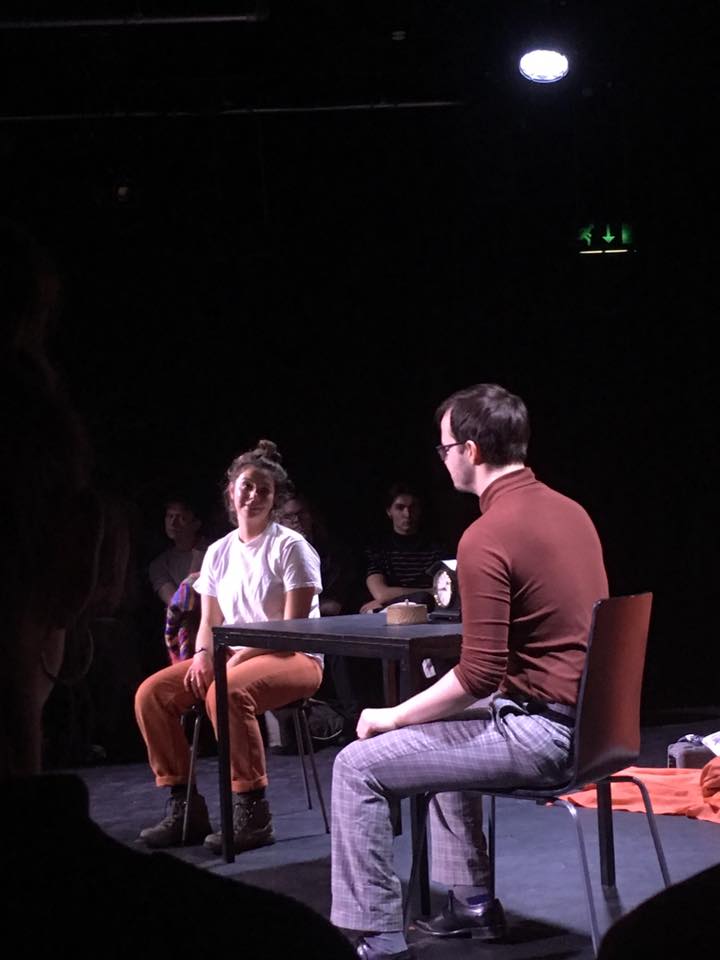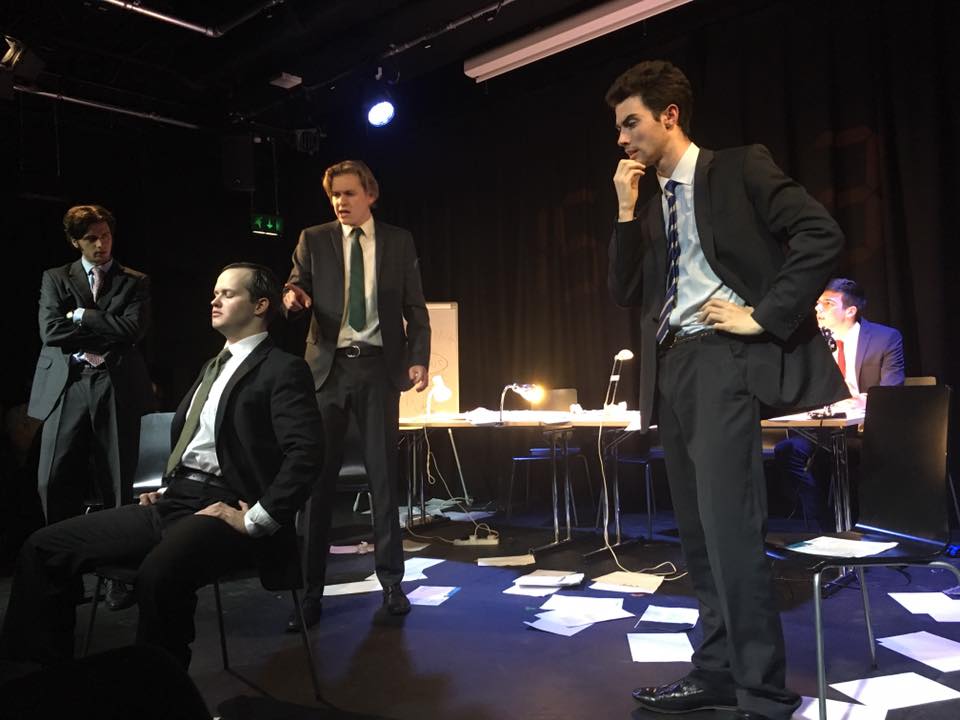IMOGEN GODDARD reviews the second night of the Women, Power and Politics showcase.
Part of UCL Drama Society’s Women, Power, and Politics showcase, the two short plays Bloody Wimmin (Lucy Kirkwood) and The Panel (Zinnie Harris) promised to be thought-provoking as well as enjoyable, and did not disappoint. The former explores the Greenham Common anti-nuclear women’s protests of the 1980s, focusing on one participant, Helen, and the subsequent tension between her and her husband before fast-forwarding twenty years to the situation in the early 2000s regarding climate change activism and feminism. The second play contrasts with the first, being set in a male dominated office environment with five men tackling the deceptively difficult task of employing a female colleague.
The showcase’s logo of a striking red Venus symbol against a white background, displayed in the theatre as the audience took their seats, was a perfect introduction to the 1980s Thatcher-era setting of the evening’s first play and encapsulated the spirits of the women depicted. A particularly outstanding scene is one between Helen (Emma Wagstaff) and her husband Bob (Lovis Maurer) when she returns home after spending weeks with the female protesters. The engaging performances present a timeless narrative: the domestic dialogue is familiar, yet Helen’s orange jumpsuit evoking prison clothing presents her as oppressed in her relationship – her rejection of the family unit and move with her unborn son back to the camp is empowering. Throughout the course of this scene, both characters talked simultaneously, neither hearing the other; this moment was slickly directed by Flo Wooley to create a sense of the lack of communication between husband and wife, whilst also reflecting the lack of communication between those for and against the women’s protests at Greenham.

In a sudden shift, the Greenham women’s poster is replaced by a Climate Change one and we move seamlessly into the early 2000s. This sudden change makes us aware of the similarities between the feminist issues of the 1980s and those of today: though the contexts may be different, we are still fighting for justice. The play deals effectively with the interaction between the past and the present, and reminds us that both must be in dialogue with one another – Bloody Wimmin concludes with a touching conversation between one of the young activists, Sophie (Sam Borje) and her grandmother Lilian (Maddy Stewart) who had campaigned at Greenham.
Rather than preaching to us, Kirkwood’s play reminds us of the complexities within today’s feminist movement – for example, when James (James Fairhead), the adult son of Helen, goes too far in his analysis of women’s behaviour and his liberality becomes a patriarchal assertion. We instinctively object to James’ mansplaining when he informs Sophie why she ‘plays into the patriarchy’ by shaving or dressing provocatively – we naturally wish to side with Sophie – but, there are moments where he makes strong points. In fact, he delivers one of the most poignant lines of the play: ‘The system’s rotting’, he says, ‘it’s just quieter now’. Though well-versed in liberal discourse, James proves the irony of his own argument by forcing his concept of feminism on Sophie. As he self-righteously regurgitates jargon, dictating that she waxes to pander to the male gaze, Sophie nonchalantly tells him that she actually waxes to make her ‘orgasms feel amazing’. As he makes claim to feminist discourse, she reclaims autonomy over her body.

We see two decades and two movements in conversation with one another in Bloody Wimmin, just as we see the second play echoing the first; the power of The Panel lies in its subtle handling of the motives behind the men appointing a female colleague. The attention to detail is superb, down to the way in which one of the male characters leans back in his chair, in a pose of pure arrogance and masculine self-assuredness. Reference is made in passing to the fact that the men were instructed to shortlist only female applicants for this position, and they enquire about a candidate’s ‘position’ and ‘background’ – undoubtedly a disguised reference to whether or not she has or may in the future have children. These quiet moments of sexism faintly echo the husband’s more overt threatening of Helen in Bloody Wimmin (‘I want to hit you’, he declared); they are a casual and off-the-cuff assertion of dominance. The men chide one another for pointing out that one candidate was ‘gorgeous’, yet they all agree. They remind themselves that there are merely a few well qualified women in the company, yet they cannot fathom having a female colleague better qualified than themselves, one who could potentially rise above them. Musician Jonathan Casewell’s drumming punctuated the men storming around the stage to create an urgent pace, evoking the rising tension amongst the five characters. The irony is, perhaps, that such a decision should not be stressful – yet the men seem unable to cope with possibility of employing a qualified and therefore threatening woman.
Bloody Wimmin and The Panel perfectly offset one another, and the contrast between the two made for an engaging evening. Fitting into the Women, Power, and Politics showcase as a whole, these plays discussed a range of issues that continue to face the feminist movement; they reminded us of the importance of understanding our history as well as deconstructing the institutionalised sexism that we continue to face today.
UCL Drama’s Women Power and Politics Showcase ran at Bloomsbury Studio on 26th, 27th, 28th October. Find more information here.





